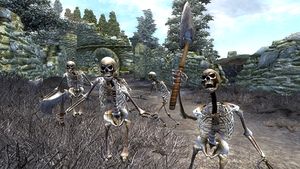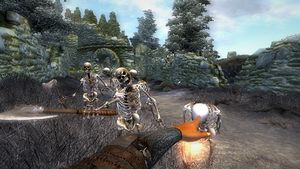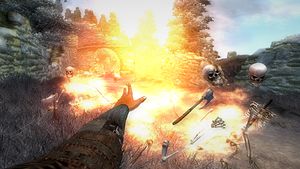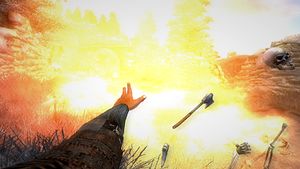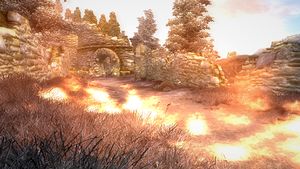This is a developer diary for The Elder Scrolls IV: Oblivion. The original diary can be found here.
Brendan Anthony - Programmer
Greetings! I am Brendan Anthony, also known as Raptormeat on the forums (and, unfortunately, sometimes also known as Mr. Meat around the office). I have been a gi-normous Elder Scrolls fan for many years and had the chance to join the team as a programmer after Morrowind. To have the opportunity to work not just on Oblivion in general, but specifically on some nifty magic, physics, and graphical effects is a tremendous honor, and I'm really psyched to reveal some of my favorite features and info to you guys.
In my humble opinion, magic is one area in which The Elder Scrolls has always excelled. The multiple schools, the vast selection of magic effects, and especially the ability to combine them together to create unique spells all add up to a very satisfying freeform gaming experience. With that in mind, one of the first things that you will notice about magic in Oblivion is that it is relatively similar to what we've seen in previous TES games. The spellmaker is there (Mages Guild members only!), we have kept the same six magic schools, and there are still a ton of magic effects and enchanted items. There's lots of new stuff too, as well as many improvements to the feel of the whole system, but as far as basic functionality the idea is evolution over revolution.
For example, in a previous developer diary, Steve Meister mentioned how players can now cast spells and swing weapons at any time, without switching from one mode to the other. This is worth mentioning again, as it's a small improvement that gives large returns – fights are more visceral, casting spells is easier, and those who use both weapons and magic will be able to do so very fluidly.
"Yeah", I hear you say, "that's all well and good for Battlemages, but what about all of us pure magic users?" Take my advice – lose the sword and replace it with a staff enchanted with a ranged spell. These babies act just like rocket launchers; when used, the caster holds the staff out in front of him/herself and hurls a powerful projectile out of the business end. Best of all, just like normal weapons, you are able to use these enchanted staffs while casting regular spells with your free hand, an experience that you won't want to miss. Combine all of this with the fact that Magicka now regenerates constantly (just like Fatigue, albeit more slowly) and mages can be pretty badass indeed.
Let's move to some pure magic goodness – projectiles, the indispensable tools of Mages across Tamriel. This time around, the team wanted to give each projectile type its own flavor, both through unique gameplay perks and cool graphical effects. Cast a Frost Damage spell, for example, and a cloud of icy vapor will issue forth, enveloping the immediate area. This cloud will hang in the air for the duration of the spell, afflicting anything that enters. Try casting a Shock Damage spell, on the other hand, and you are in for a much different experience. There's no meandering cloud or contained ball involved here; casting Shock Bolt will let loose a white-hot lightning bolt, which rips through the air towards the target and then chains out to anyone unlucky enough to be standing within the area of impact. Even the classic fireball has received some upgrades. A Fire Damage spell will cause the target(s) to burst into flame for as long as the spell lasts. If they're really unfortunate, it will be an area spell and create a huge explosion, blowing characters, clutter, and scenery back with the all of the kinetic energy stored within. (sidenote: Havok physics + giant explosion + flaming skeletons = I love my job!)
Of course, there's a lot more to the magic system than fireballs and lightning bolts. Many of the spells from Morrowind have been given major facelifts, or reworked entirely, in an effort to make the system as exciting and useful as possible. My personal favorite is Detect Life. In Morrowind, this effect placed icons on the minimap indicating where creatures or characters could be found. It was a nice effect but not workable for Oblivion, so now when Detect Life is cast, a magical cloud, which is visible even when the creature is not, will envelop each nearby creature. You can watch these clouds to track potential targets, and usually you can even identify which creature you are looking at by the specific shape and movement of its cloud. This effect is sometimes paired with the new Night Eye – a useful combo in our dark, atmospheric dungeons. More importantly, the spell gives the player extra information without breaking immersion, so when you cast the spell you actually feel like a sneaky wizard spying on your enemies. Score!
Many effects have gotten this treatment. Thanks to Havok physics, Paralysis, in addition to being a crippling tactical nightmare, is now also totally hilarious. Nothing says "step off" like freezing your opponent solid and watching him fall flat on his face!
Some of the cooler effects are only possible because of our graphics engine, which makes heavy use of pixel and vertex shaders to achieve some very images. The Chameleon spell, for instance, uses our awesome refraction special effect to render targets nearly invisible, like a block of clear walking ice or a cloaked Predator. I didn't work on this one personally, so I feel comfortable bragging that its one of the coolest effects of its kind that I've seen – Oblivion is definitely the first Elder Scrolls game that has been able to do Chameleon justice.
Now that you've heard a little bit about the gameplay and graphics improvements, I imagine some of you are wondering about the content creation side of things, specifically – what in the magic system is editable? For starters, there are lots of options to tweak on the existing spell effects, such as the sounds, art, and special shader effects, along with the specific items and creatures that are used for the summoning spells. But we know that just tweaking our spells isn't enough for you guys, so there is one brand new, very special magic effect that we hope will give modders a great deal of creative freedom. It's called Script Effect, and using it in conjunction with the scripting system, modders will be able to expand the magic system and create spells that do things we at Bethesda haven't even thought of yet.
You could make a spell that changes the weather, or forces the target NPC to find a bed and go to sleep, or places a special item in the player's inventory. Just about anything that is possible with the scripting system is possible with Script Effect. In fact, our designers have used Script Effect to implement a number of unique spells that would have otherwise been impossible to create with the generic spell system... Let's just say that Sheogorath would be proud!
I hope you enjoyed learning a bit about what we've been working on lately. At this stage of production we are all very busy tweaking, optimizing, and polishing for release. It's a harrowing process, but we are able to go through it with the knowledge that someday very soon, you will all be able to take a crack at what we've been working on for so long. As a former (and current) diehard Elder Scrolls fan, I can only say that I couldn't be more excited!

